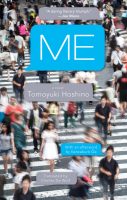 Author: Tomoyuki Hoshino
Author: Tomoyuki Hoshino
Translator: Charles De Wolf
U.S. publisher: Akashic Books
ISBN: 9781617754487
Released: June 2017
Original release: 2010
Awards: Kenzaburō Ōe Prize
My introduction to the work of Tomoyuki Hoshino was through We, the Children of Cats, a volume containing a selection of his short stories and novellas which left a tremendous impression on me. Since encountering that collection, I’ve made a point to seek out and read everything of Hoshino’s that has been translated into English. (Sadly, there hasn’t been very much.) I was very excited to learn that Akashic Books would be publishing Charles De Wolf’s translation of ME, a book which quickly become one of my most anticipated literary releases of 2017. After Lonely Hearts Killer, ME is only the second of Hoshino’s novels to be released in English. Originally published in Japan in 2010 under the title Ore Ore (It’s Me, It’s Me, a reference to a common telephone scam), the novel would go on to win the 2011 Kenzaburō Ōe Prize and was later adapted as a live-action film directed by Satoshi Miki in 2013. In addition to the main text, the English-language edition of the novel also includes an afterword by Kenzaburō Ōe as well as a brief essay from the translator. Hoshino’s works can be challenging and demanding, but in my experience they can also be powerfully rewarding and meaningful; I was looking forward to reading ME a great deal.
When a stranger accidentally leaves his cellphone on the wrong food tray at a McDonald’s, the novel’s narrator Hitoshi Nagano makes an impulsive decision–he simply walks out of the restaurant with it. As a joke he calls the mother of the cell phone’s owner, pretending to be her son Daiki Hiyama. But he ends up taking the prank a little too far, not quite intentionally convincing her to transfer ¥900,000 into his bank account. Much to Hitoshi’s surprise, a few days later Daiki’s mother suddenly shows up at his apartment acting as though he is in fact her erstwhile son. Understandably and extraordinarily confused by this turn of events, Hitoshi makes a point to visit the home of his own mother only to discover that there’s already a Hitoshi Nagano there. And what’s more, he isn’t the only one to have recently visited claiming to be Hitoshi Nagano. With multiple people seeming to be posing as him, the only identity that remains available for Hitoshi to take appears to be that of Daiki Hiyama. And that’s when things start to get really strange.
Themes of identity and the fluidity of self can be found in many of Hoshino’s translated works, but they are particularly prominent in ME where they form the absolute core of the story being told. Both Hoshino’s long fiction and short stories can often be fairly surreal and ME is certainly no exception, although I do feel that the novel is probably one of his more readily accessible long-form works. Granted, none of the characters are especially likeable, but the basic premise of ME, while incredibly and increasingly strange, is still straightforward enough to follow at the surface level. However, to truly and fully appreciate the entirety of the novel and its depth not only demands but requires a particularly careful and close reading of the text. It would be very easy for readers to get lost if they don’t pay close attention to what is happening and how the novel and its language subtly shifts and changes along with the narrator’s identity. Even the genre isn’t fixed and transforms as the story progresses–ME begins as a peculiar comedy but by its end has dramatically evolved into dystopic horror. The narrative development of ME is both fascinating and perplexing.
Similar to other works by Hoshino, reading ME is an immensely thought-provoking but disorienting experience. The novel’s narrator, who is always himself but not always in the ways he expects to be, is enduring a fantastical identity crisis which, on occasion, still manages to be oddly relatable. He encounters more and more people who are him but not him, their backgrounds and personalities slowly blending together with less and less to differentiate among them. At first there is a sense of euphoria in finding like-minded people, but eventually a tremendous uneasiness begins to develop–hatred of others becomes hatred of self and vice versa, ultimately erupting in a violent confrontation which is part of a vicious cycle that is extremely difficult to escape or nullify. ME is intensely psychological and philosophical, the story using speculative fiction to outline a cerebral exploration of self, society, and the relationship between them. The novel can be simply read for entertainment, but if allowed it also prompts readers to examine the volatile nature and meaning of identity. Hoshino’s work tends to stick with me and I know I’ll be thinking about ME and the ideas it presents for quite some time.
Thank you to Akashic Books for providing a copy of ME for review.

This sounds incredible and terrifying! Will at to my TBR list!
I hope you enjoy if you get a chance to read it! Hoshino’s works can be pretty intense in a number of different ways. I think they’re worth the effort it takes to read them, though. :)